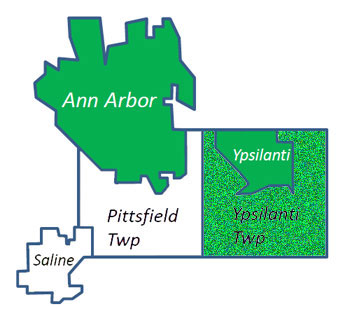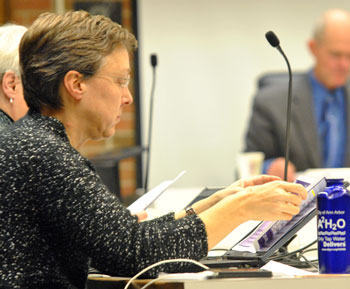AAATA: Ypsilanti Township Boards Bus
Ann Arbor Area Transportation Authority board meeting (Sept. 26, 2013): The board took two significant actions at this month’s meeting. First, board members approved AAATA’s operating budget for the 2014 fiscal year, which starts Oct. 1. The board also approved a revision to its articles of incorporation, adding Ypsilanti Township as a member and expanding the board from nine to 10 members.

Ypsilanti Township is now a member of the Ann Arbor Transportation Authority, pending consideration by the Ann Arbor and Ypsilanti city councils. (Green indicates the geographic area included by the AAATA.)
If the Ann Arbor city council does not object, this would be the second expansion of the AAATA board this year. The item is expected to be on the Ann Arbor city council’s Oct. 21 agenda.
The earlier expansion was given final approval by the AAATA board at its June 20, 2013 meeting. That’s when the city of Ypsilanti was admitted as a member of the AAATA and its board was increased from seven to nine members, one of whom is appointed by the city of Ypsilanti.
Regarding the budget, on Sept. 26 the board approved a $33.97 million expenditure budget for fiscal year 2014. The budget includes revenues that almost exactly balance those expenditures, leaving an excess of $20,500. About half of the revenue to the AAATA comes from local sources (taxes, purchase of service agreements and fares) with most of the rest funded from state and federal support. The budget will fund roughly 7 million total passenger trips for the next year, according to the AAATA.
Also at its meeting, the board approved the selection of the law firm Pear Sperling Eggan & Daniels P.C. to handle AAATA’s legal work. The firm already handles legal work for the transit authority, so the board’s approval means that Pear Sperling will continue in that capacity for the next five years.
As a result of another board action at the Sept. 26 meeting, Charles Griffith will be leading the board for another year as chair. He was first chosen as chair last year by his colleagues. The pattern of chairs serving for two years is typical for the AAATA.
It was the first board meeting Jack Bernard attended as a board member since being confirmed by the Ann Arbor city council on Aug. 19, 2013. However, three other board members did not attend the AAATA meeting: Roger Kerson, Anya Dale and Gillian Ream Gainsley.
Those who did attend received several updates on various projects, including construction on the new Blake Transit Center in downtown Ann Arbor, AAATA’s new website, and activity related to the southeast Michigan regional transit authority (RTA). The next board meeting of the nascent four-county authority – which includes the city of Detroit and the counties of Washtenaw, Wayne, Oakland, and Macomb – will be held at 2 p.m. on Oct. 2 at the downtown location of the Ann Arbor District Library. [Full Story]




